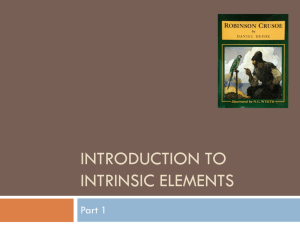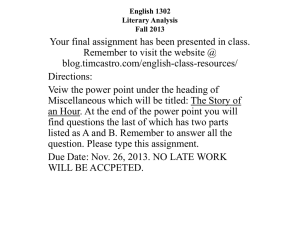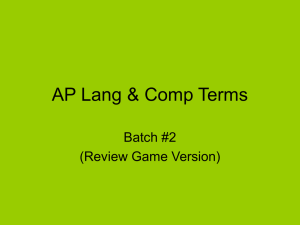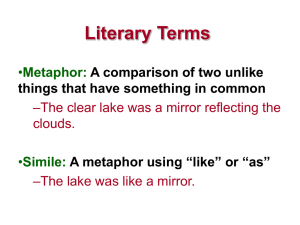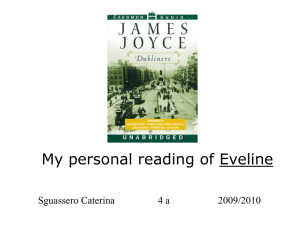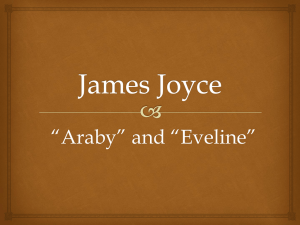Everyday Use
advertisement
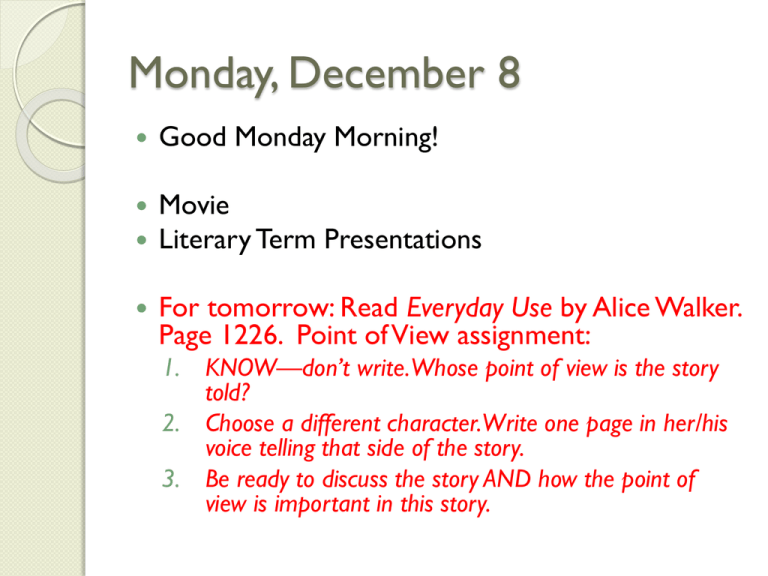
Monday, December 8 Good Monday Morning! Movie Literary Term Presentations For tomorrow: Read Everyday Use by Alice Walker. Page 1226. Point of View assignment: 1. KNOW—don’t write.Whose point of view is the story told? 2. Choose a different character.Write one page in her/his voice telling that side of the story. 3. Be ready to discuss the story AND how the point of view is important in this story. Tuesday, December 9 Good Morning! Upcoming schedule Finish last moments of Daisy Miller movie. Literary term presentations Everyday Use by Alice Walker ◦ First—question 1: Should Mama have given Dee the quilts she wanted? Yes? No? Textual evidence to support your argument. ◦ Second—voice: Why is mother a good choice for this story? Think about your own home… ◦ Homework (Journal): Respond to this prompt: Think about the objects in your home. Do you have any that have been passed down from other family members? If you were to move away to live on your own, which objects would you want to take with you? Why? Would your family let you take it? Explain. Schedule through Dec 23 Tuesday: Everyday Use--basics Block: Everyday Use—irony, critical lenses Friday: Everyday Use—critical lenses Monday-Friday, Dec 15-19: A Good Man is Hard to Find, page 1211 Monday & Tuesday, Dec 22 & 23: Poetry Read over break: The Dead, page 162, which despite it’s morbid name is actually about a holiday party (journal instructions to come). Block, December 11. Oh my so much to discuss… Good Morning! Books to read over break? ◦ The Dead (required—within the big book) ◦ Invisible Man ◦ Ceremony Literary Term Presentations Everyday Use: POINT OF VIEW assignment. Read, share, turn in. Then, What is your item of value? Isn’t it ironic… finally Everyday Use: IRONY & OTHER LITERARY TECHNIQUES Finish for tomorrow Everyday Use: THINKING LENSES Friday, December 12 Good Morning! ◦ Essays ◦ Literary Term presentation (2) Everyday Use ◦ Literary techniques ◦ thinking lenses Homework for Monday: Read A Good Man is Hard to Find, page 1211. Complete guided reading notes (next slide). ◦ Flannery O’Connor—1955, writing described as Southern Gothic…life after the civil war, grotesque realism, true stereotypes of people—white, black, poor, southern belle, religious and racial divisions. ◦ Friday Dancing Music The Brainstorm Chanhassen’s new literary magazine, is looking for student writers and artists! Submit your • Short stories • Poems • Songs • Drawings • Photographs • Paintings chanlitmagazine@g mail.com Monday, December 15 Good Morning! Literary Term Presentations A Good Man is Hard to Find ◦ Initial thoughts? ◦ Go through the notes you took. ◦ Choose any of the Questions for Discussion at your pods ◦ How does the Grandmother’s reasoning with The Misfit change as time goes on? Why? Thesis statement. ◦ Homework for tomorrow: Read the story again. Be prepared to discuss Questions on Style & Structure A Good Man is Hard to Find Guided Reading: As you read, jot down notes on the following: 1. Exaggeration 2. Subtle forms of violence 3. Epiphanies, big and small 4. Foreshadowing 5. References to slavery or racism 6. References to gentility 7. References to the Seven Deadly Sins Tuesday, December 16 Good Morning! Literary Term Presentations A Good Man is Hard to Find ◦ Quotes ◦ Homework: Read Flannery O’Connor’s “Some Aspects of the Grotesque in Southern Literature” and “Milledgeville: Flannery O’Connor and Alice Walker” ◦ Highlight (underline?) points that you think are “true” or important about life or about writing. (NOT facts about the authors). Be ready to discuss your favorite. Block, December 18 Good Morning! Literary Term presentations. ◦ Next literary term quiz is January 8 Please take our the southern literature reading. ◦ What did you choose? ◦ At your pod, discuss 2 or 3 as they relate to Everyday Use and A Good Man is Hard to Find. ◦ Be ready to share Thinking Critical Lenses. Overview. Determine which story you’d like to discuss (Everyday Use or a Good Man is Hard to Find). Work with someone who wants to discuss the same story and apply each lens to the story. If time, an AP poem treasure hunt. On a sad poem about death. Homework for Friday: Read A Rose For Emily by William Faulkner, pages 657-663. Homework for Monday: Choose one of the Exploring the Text or Suggestions for Writing questions about one of the three stories: Everyday Use (1232), A Good Man is Hard to Find (1225), or A Rose for Emily (664). Or, show how you applied one of the lenses to one of the story. Submit to turnitin.com, as you did for Daisy Miller. The goal of this assignment is to think about the literature deeply. If you do any reading/research on the subject, you MUST cite your source. Monday, December 22 Good Morning! Literary Term presentations A Rose for Emily ◦ Discussion Questions Will you be absent tomorrow? Please take an Emily Dickinson poem study. We’ll be completing it in class tomorrow. Read over break: The Dead, page 162, which despite it’s morbid name is actually about a holiday party. As you read, journal about each character. New Seats (find your people & choose any pod): Alia, Dominic, Conner & Elise Tyler H, Emily H, Emily J & Tyler K Liz, Alyssa, Eric & Jack Eileen, Naomi, Monica & Dane Daniel, Haley, Jackie & Jenna Bailey, Claire, Sheridan & Hayley Get to know each other—share favorite & worst holiday food or experience. January 5, 2015 Welcome Back…The year of your graduation! Looking Ahead… ◦ ◦ ◦ Literary Term Test: January 8 In-Class Essay on The Dead: January 14 Final Time—Peer Review of essay and socratic seminar ◦ ◦ Poetry Study—January 20-30. Read Invisible Man by February 2. Select ONE quote from each chapter that stands out to you as. Write a brief explanation of its importance. Today ◦ ◦ ◦ Literary Term Presentation The Dead comments James Joyce video ◦ HOMEWORK: Read & Annotate Eveline by James Joyce. As you read, consider these questions and try to find textual evidence that help answer the questions. Who is Eveline? What do you imagine her to be like? What is important for us to know about Eveline? Do you “like” her? How many other characters are there? Are they really there? Where is Eveline? What is she doing? What does she remember? What are the flashbacks? Pay attention to the temporal words (words that relate to time)…even now, when, but latterly, and now Should Eveline go with Frank? What would let her go? What would stop her? Does Eveline need approval from someone or God to go? Does she escape? What would she be escaping from? What is the opposite of escape? James Joyce is known for writing characters who experience an epiphany. Does Eveline? James Joyce said he writes with scrupulous meanness. What does that mean to you? How does he do it? James Joyce said his writing examines the failures of public life—social, religious, cultural and political systems. Choose a pod to sit at based on your interest in Eveline… This might not be where your best friend is! 1. Characters 2. Nostalgia 3. Senses—Sight, Sounds, etc. 4. The problem(s) 5. Escape…or not 6. Expectations: Social, religious, cultural, political January 6, 2015 Eveline Read out loud. Listen! At your pods, discuss indepth in 3 ways: literal, interpretive, experiencereader-response. 1. Characters 2. Nostalgia 3. Senses 4. The problem(s) 5. Escape 6. Public Life-Expectations: Social, religious, cultural, political Looking Ahead… ◦ Literary Term Test: January 8 ◦ In-Class Essay on The Dead: January 14 ◦ Final Time—Peer Review of essay and socratic seminar ◦ Poetry Study—January 20-30. ◦ Read Invisible Man by February 2. Select ONE quote from each chapter that stands out to you as. Write a brief explanation of its importance. Literal: Factual from the text. Leads to an accurate and complete summary of the text. Interpretive-Inferential: Require analyzing or interpreting parts of the text. What do you infer? What do you read between the lines? Leads to understanding the text. Experiential-Reader Response: Connect your experiences with the text. Leads to deeper appreciation of the text. Thursday, January 8 Good Morning! 10 minutes—review your literary terms Literary Term Quiz #3 ◦ When finished & waiting…read The Dead The Dead quotes ◦ Read your quote. Discuss with your table: What it means Any literary “coolness” about it—think of your literary terms. How does the writing help us understand or appreciate the quote? How does this quote help us understand the meaning of the work as a whole? Close Reading Partner Work: Close Reading A—Complete your study by doing the following: ◦ ◦ ◦ ◦ ◦ Peruse the story to find a “rich” paragraph—one that has the meaning, vocabulary, symbols, sentence structure, etc. to help us understand something in the story. Read it multiple times, with pen and paper in hand. First: Determine general meaning. What’s going on? How do I know? Second: Study the author’s choices…diction (denotation/connotation), syntax, similes, metaphors, literary devices (know your terms!), tone (use your tone worksheet). How do the author’s choices help me understand or appreciate something in this part of the text (that perhaps I didn’t notice the first time through)? Third: Consider thematic, big picture meaning. Are there connections to other texts? Other characters? How does this reading help us understand the human condition? B—Create questions for another partnership to study your paragraph. C—Groups of 4 get together to discuss both paragraphs.





